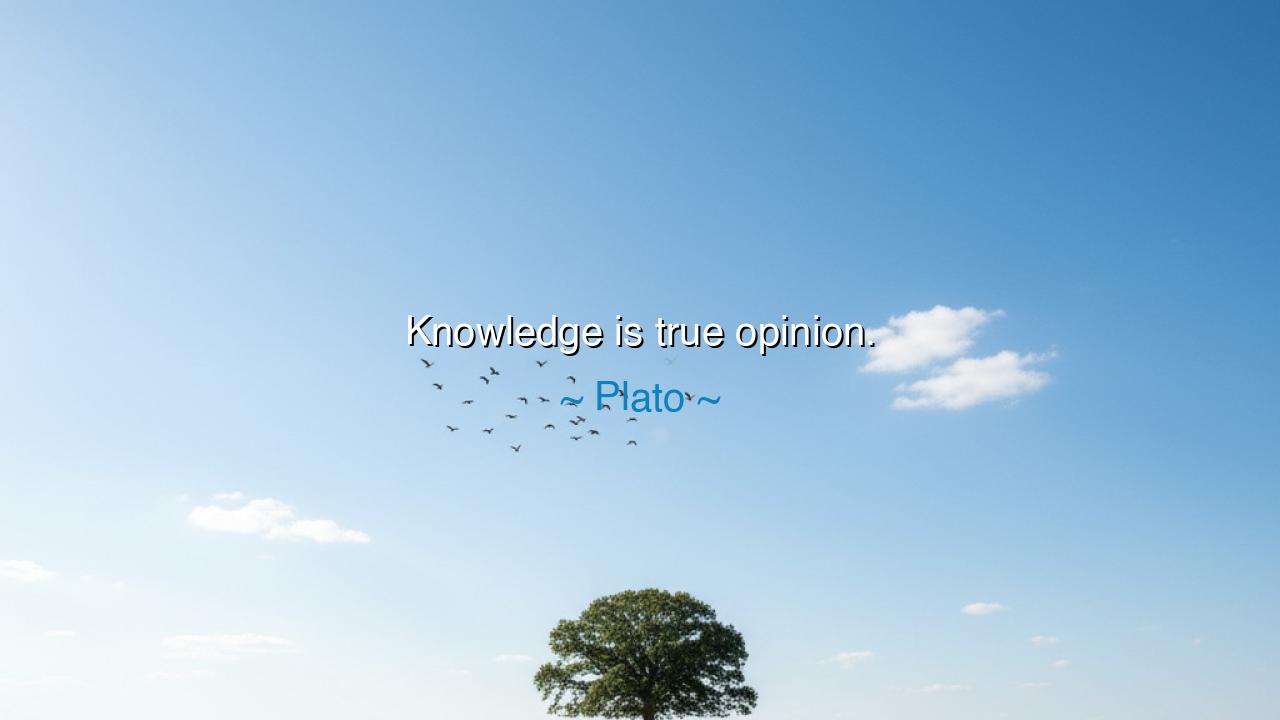
Knowledge is true opinion.






Hear now the words of Plato, the philosopher of Athens, pupil of Socrates and master of dialogues: “Knowledge is true opinion.” This utterance, though short, is heavy with meaning. For in it, Plato sought to draw the line between belief and truth, between mere appearance and reality. He shows us that not all opinions are equal. Many are shadows, fleeting and unstable, but when an opinion is tested, anchored in reason, and aligned with truth, it becomes more than a guess—it becomes knowledge.
The ancients often wrestled with this mystery: what is it to know? Socrates, in Plato’s dialogues, questioned the wise of Athens, stripping away false certainty until only humility remained. He distinguished between mere opinion, which may shift like sand, and knowledge, which is grounded like stone. Yet he also taught that true opinion, though fragile, can guide a man rightly—just as a traveler may reach his destination by following a correct path, even if he cannot yet explain why it is correct. Plato, reflecting on this, declared that when opinion is tethered by reason and truth, it transforms into knowledge.
Consider the story of Christopher Columbus. For many, the opinion of his age was that the seas beyond Europe were empty or impassable. Others opined that the earth was flat. But Columbus, guided by study and calculation, held the true opinion that the earth was round and that lands lay westward. His opinion, tested against reality, became knowledge, and his voyage altered the course of human history. Here we see Plato’s wisdom: opinion alone is weak, but when confirmed by truth, it becomes enduring knowledge.
Plato himself used examples from daily life. A man may have the opinion that a certain road leads to Athens. If he is correct, and if experience confirms it, then his opinion is no longer guesswork—it is true, and thus worthy of being called knowledge. But if he merely repeats what others say, without testing it, his belief is fragile, liable to collapse when challenged. Thus, Plato teaches us that we must not be content with untested opinions, but must seek their truth, binding them with reason until they are transformed into wisdom.
This teaching is also a warning. For the world is full of opinions—loud, confident, and unexamined. Men often mistake these for truth, clinging to them fiercely, even when they are false. Such opinions breed conflict, pride, and error. But when one is humble enough to test his beliefs, to seek evidence, to measure against reason, then his opinions grow into knowledge, and he walks no longer in darkness, but in light.
The lesson for us, then, is clear: do not despise opinion, but do not rest in it. Let your beliefs be tested, refined, and shaped by truth. Seek always to move from mere assumption into reasoned understanding. Hold your opinions lightly, until you have proven them; then, once they are grounded, hold them as knowledge, firm and enduring.
What then must you do? Examine your beliefs each day. Ask: Is this true? What is the reason? What evidence supports it? Do not fear correction, for it leads you from shadow to light. Read, reflect, test, and question, until your opinions stand as truths confirmed by reason. For only then will your mind be steady, your path clear, your wisdom real.
Thus remember Plato’s words: “Knowledge is true opinion.” They remind us that the journey from belief to truth is the journey of the soul itself. Begin with opinion, but do not end there. Transform it, bind it with reason, and let it become knowledge. For in this transformation lies the path to wisdom, and the key to living a life of truth.






AAdministratorAdministrator
Welcome, honored guests. Please leave a comment, we will respond soon